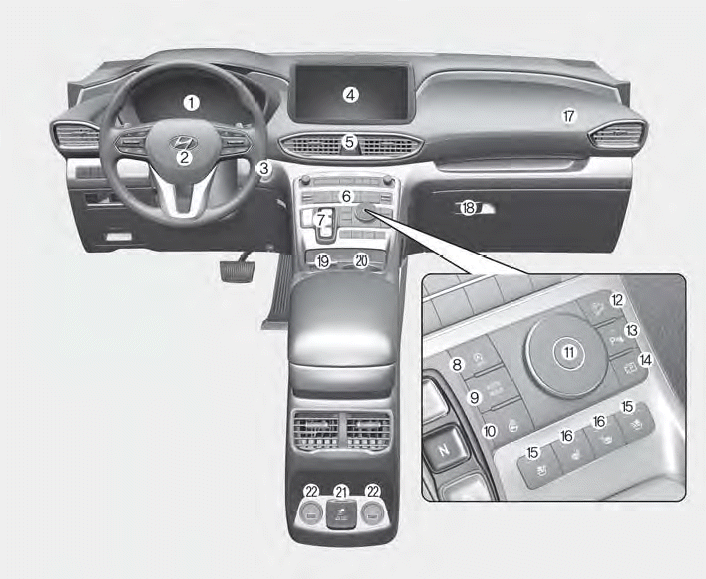Hyundai Santa Fe: Fuel Delivery System / Release residual pressure in fuel line
Hyundai Santa Fe (TM) 2019-2025 Service Manual / Engine Control/Fuel System / Fuel Delivery System / Release residual pressure in fuel line
| Release Residual Pressure in Fuel Line |
|
| 1. |
Turn the ignition switch OFF and disconnect the battery (-) cable.
|
| 2. |
Remove the fuel pump fuse (A).
|
| 3. |
Connect the battery (-) cable.
|
| 4. |
Start the engine and let idle, and then turn the ignition switch OFF
after the engine has stopped on its own.
|
| 5. |
Disconnect the battery (-) cable, and then install the fuel pump fuse.
|
| 6. |
Connect the battery (-) cable.
|
| 7. |
Delete the Diagnostic Trouble Code (DTC) related the fuel pump fuse
with the diagnostic tool.
|
 Fuel pressure test
Fuel pressure test
Fuel Pressure Test
1.
Release the residual pressure in fuel line.
(Refer to Delivery System - "Release Residual Pressure in Fuel Line")
•
When removing the fuel pump fuse, a Diagnostic Trouble
Code (DTC) may occur...
 Fuel Tank. Repair procedures
Fuel Tank. Repair procedures
Removal
•
Be careful not to damage the parts located under the vehicle
(floor under cover, canister, fuel tank) when raising the vehicle
using the lift...
Other information:
Hyundai Santa Fe (TM) 2019-2025 Owner's Manual: Checking the engine oil and filter
We recommend that the engine oil and filter be changed by an authorized HYUNDAI dealer according to the Maintenance Schedule at the beginning of this chapter. WARNING CALIFORNIA PROPOSITION 65 WARNING Engine oil contains chemicals known to the State of California to cause cancer, birth defects and reproductive harm...
Hyundai Santa Fe (TM) 2019-2025 Owner's Manual: Winter precautions
Use high quality ethylene glycol coolant Your vehicle is delivered with high quality ethylene glycol coolant in the cooling system. It is the only type of coolant that should be used because it helps prevent corrosion in the cooling system, lubricates the water pump and prevents freezing...
Categories
- Manuals Home
- 4th Generation Santa Fe Owners Manual
- 4th Generation Santa Fe Service Manual
- Troubleshooting
- Folding the side view mirror
- Smart liftgate
- New on site
- Most important about car
Instrument panel overview

1. Instrument cluster
2. Driver’s front air bag
3. Engine Start/Stop button
4. Infotainment system
5. Hazard warning lamp switch
6. Climate control system
7. Shift button
8. ISG (Idle Stop and Go) button
9. Auto Hold button
10. Heated steering wheel button
11. Drive mode button
12. DBC (Downhill Brake Control) button
13. Parking Safety button
14. Parking/View button
15. Air ventilation seat button
16. Seat warmer
17. Passenger’s front air bag
18. Glove box
19. Wireless charging system pad
20. Cup holder
21. AC inverter
22. USB charger
Copyright © 2025 www.hsafe4.com


